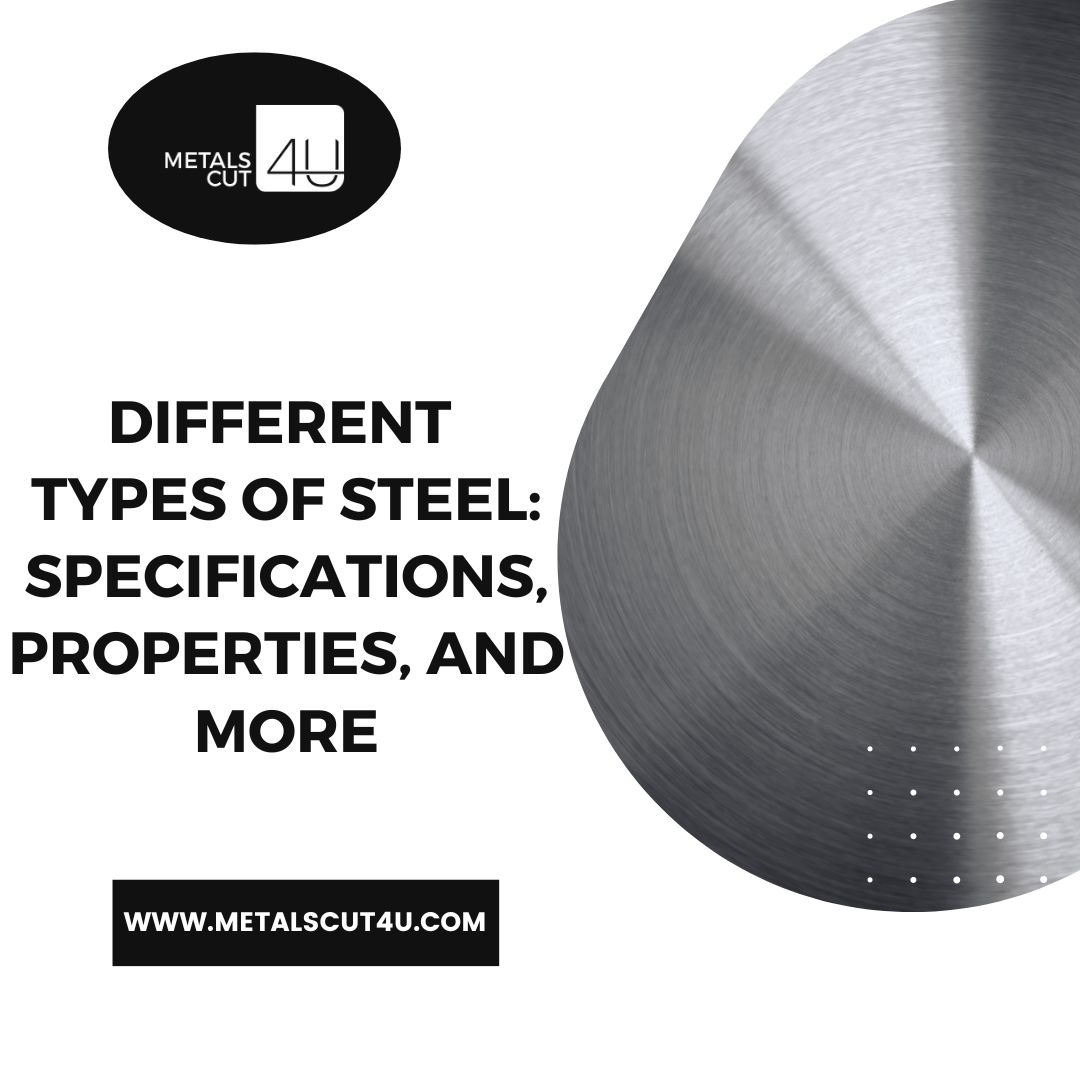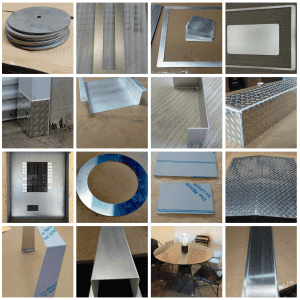Different Types Of Steel: Specifications, Properties, And More

Steel is one of the most powerful metals that comes in several distinct grades with unique compositions and properties. Steel itself combines two elements, iron and carbon, providing improved strength and fracture resistance against rust, corrosion, and more.
Based on your project requirements, steel can be mixed with elements to enhance the existing properties and make the metal suitable for unique applications. Each type of steel has unique and distinctive characteristics that can be used for respective fields of industries.
When mixed with different elements, the strength, and durability of the steel alloy are determined depending on the formulation and category of the specific application. To be specific, you can easily increase or decrease the strength, durability, and other characteristics of the metals with the correct formulation technique.
Finding the right metal for your business project or personal use can be challenging, especially if you’re not familiar with the properties and characteristics of different steel alloys.
This blog will walk you through some of the most common types of steel used for a wide range of applications that you can consider for your business or personal use. Let us explore the most frequently used and widely preferred steel alloy for various applications.
What Are The Different Types Of Steel Metal?
1. Carbon Steel
Most types of steel around the world are a form of carbon steel mixed with specific amounts of varying alloying elements. As per the studies, carbon accounts for 90% of all carbon steel production as the main alloying element. Carbon helps create a stronger and more rigid alloy metal. There are three main types of carbon steel, high-carbon steel, medium-carbon steel, and low-carbon steel. High-carbon steel contains about 0.61% to 1.5% carbon content, medium steel contains around 0.6% to 0.31% carbon, and low-carbon steel contains up to 0.3% carbon.
2. Alloy steels
Unlike other types of steel, alloy steel contains a varying amount of different metals besides iron. Different elements help manipulate the properties of steel to serve specific applications for different industries. Elements such as aluminum, nickel, silicon, chromium, manganese, copper, titanium, and more are used in distinct capacities to create unique alloy steels. Alloy steel is further characterized into high alloy steel and low-alloy steel types. High-alloy steel is a grouping of various ferrous metals that help stabilize the composition of the alloy metal. Similarly, low-alloy steel is a combination of ferrous metals to improve the overall mechanical properties of the alloy metal.
3. Stainless steel
Chromium serves as the primary element in making stainless steel. Chromium accounts for up to 20% of the total steel composition in this alloy. Stainless steel, previously known as rustless steel, is one of the most popular types of steel in the market. It is popular for its appearance and significantly-high resistance to rust. Specifically, it is 200 times more resistant to corrosion and rusting than other steel alloys. Stainless steel is further characterized into two types, ferritic stainless steel and austenitic stainless steel.
4. Tool steels
Tool steel is one of the most common types of steel used for producing different tools for various applications and purposes, including cutting tools, impact tools, making tools, and more. Tool steels are usually made of tungsten, cobalt, molybdenum, and vanadium elements. The percentage of metals may vary depending on various factors and the usage of applications. Comparatively, tool steel is more durable, tough, and highly heat-resistant. Which type of tool steel to select depends mainly on the needs, requirements, and purpose of your business or personal project.
5. Tungsten steel
Tungsten steel has the highest melting point among all metal types in its purest form. When it comes to strength and durability, tungsten steel simply has no match. It can withstand high temperatures and pressure and has greater resistance to corrosion and rusting. One of the main reasons why tungsten steel is considered the perfect option for making different aircraft equipment. You can also combine tungsten steel with other durable and strong metals or elements to increase its properties.
6. Nickel steel
Nickel steel is one of the common steel types used worldwide for various purposes. Nickel steel comprises about 3.5% of nickel and 0.35% of carbon content. Adding nickel strengthens the metal structure to make it more resistant to corrosion, high impacts, shocks, and loads and increases the strength. Additionally, nickel steel offers incredible responsiveness to heat treatment. Ensure correct fabrication or combination techniques is used to get the best results. Hire professional services if this is your first time or you’re unaware of the appropriate technique to create an alloy.
7. Manganese steel
Manganese steel is made of 11% to 14% of manganese content which works wonders for the hardening of steel. Manganese steel is often the first choice for making railway tracks and other sturdy structures in the manufacturing industries. Manganese steel can be used for a number of complex applications, such as shot blast cabinets, anti-drill security plates, etc. The fabrication method for manganese steel can be more complex and time-consuming due to its greater strength and durability.
At MetalsCut4U, we consist of a highly-skilled and experienced professionals who help fabricate customized metal sheets or structures at affordable prices. Get in touch with us today to learn more about our metal fabrication services and discover the best option for you.
8. Vanadium steel
Vanadium is one of the most popular steel options in various manufacturing and machinery industries. Vanadium steel has high corrosion resistance properties and a remarkable ability to absorb shocks. Vanadium steel is popularly used in aerospace industries as a thin layer to bond titanium with other metals for various applications.
9. Chromium steel
Chromium is one of the hardest metals on the earth, offering remarkable resistance against rust, corrosion, wear and tear, and more. About 10% to 20% of chromium elements is enough to increase the tensile strength and durability of the metal. Chromium steel is ideal for the making of applications that are exposed to moisture and corrosive environments. Chromium steel is further characterized into three types: austenitic, ferritic, and martensitic.
10. Chromium-vanadium steel
Chromium-vanadium steel contains varying amounts of chromium and vanadium elements. The composition of the alloy element can differ depending on the project needs and requirements of your project. Both chromium and vanadium are great elements that can significantly increase the characteristics of steel and make it suitable for various manufacturing applications. Common uses of chromium-vanadium include gears, axles, connecting tools, vehicular frames, and other manufacturing tools.
Compared to other metals, chromium-vanadium steel is relatively more flexible and easy on machines. Chromium-vanadium steel is suitable for use in high-stress applications.
11. Silicon steel
Silicon steel, also known as a transformer or electrical steel, is a common steel-type alloy used in making electrical applications such as transformers, motors, and generators. Silicon steel can significantly improve the magnetic properties and electrical conductivity of steel. Silicon steel has high electrical resistance, which makes it easier to reduce eddy currents that result in energy loss. The alloy is also resistant to rust and corrosion, which helps extend the lifespan of electrical applications.
12. Molybdenum steel
Molybdenum is a high-performance alloy widely popular in making industrial applications. In molybdenum steel, molybdenum is the primary alloying element that helps improve the steel's strength and durability. It is highly resistant to deformation and degradation at high temperatures, which is why it is the most suitable metal for making applications that require high-temperature strength, such as jet engines, power plants, and more. It is also used in aerospace, construction, automotive, and defense equipment applications.
13. Cobalt steel
High-speed steel, popularly known as cobalt steel, is a steel alloy with high levels of cobalt, tungsten, and chromium elements. The alloy has high wear resistance and is easy to machine for creating various industrial applications. Cobalt steel is commonly used for making cutting tools such as drill bits, milling cutters, taps, and high-temperature applications used in aerospace and metalworking industries. If you are looking for a versatile and durable metal that offers excellent performance, cobalt steel is the perfect choice.
14. Aluminum steel
Aluminum steel is aluminum-coated steel that provides several advantages to steel, such as improved corrosion resistance, surface hardness, and heat reflectivity. Aluminum steel is a versatile and affordable steel option that can be used in making a wide range of applications where corrosion resistance and heat management are critical.
At MetalsCut4U, we offer affordable metal fabrication services that help businesses or individuals get desired cuts on their metal structures for their personal or business projects. With profound years of experience in the industry, we know what it takes to fabricate tough and high-tensile steel using appropriate cutting techniques and tools. Browse our website or contact us at 440-822-6381 to learn more about our services.
